Cognitive behavioural therapy (group) for schizophrenia
- PMID: 35866377
- PMCID: PMC9308944
- DOI: 10.1002/14651858.CD009608.pub2
Cognitive behavioural therapy (group) for schizophrenia
Abstract
Background: Schizophrenia is a disabling psychotic disorder characterised by positive symptoms of delusions, hallucinations, disorganised speech and behaviour; and negative symptoms such as affective flattening and lack of motivation. Cognitive behavioural therapy (CBT) is a psychological intervention that aims to change the way in which a person interprets and evaluates their experiences, helping them to identify and link feelings and patterns of thinking that underpin distress. CBT models targeting symptoms of psychosis (CBTp) have been developed for many mental health conditions including schizophrenia. CBTp has been suggested as a useful add-on therapy to medication for people with schizophrenia. While CBT for people with schizophrenia was mainly developed as an individual treatment, it is expensive and a group approach may be more cost-effective. Group CBTp can be defined as a group intervention targeting psychotic symptoms, based on the cognitive behavioural model. In group CBTp, people work collaboratively on coping with distressing hallucinations, analysing evidence for their delusions, and developing problem-solving and social skills. However, the evidence for effectiveness is far from conclusive.
Objectives: To investigate efficacy and acceptability of group CBT applied to psychosis compared with standard care or other psychosocial interventions, for people with schizophrenia or schizoaffective disorder.
Search methods: On 10 February 2021, we searched the Cochrane Schizophrenia Group's Study-Based Register of Trials, which is based on CENTRAL, MEDLINE, Embase, four other databases and two trials registries. We handsearched the reference lists of relevant papers and previous systematic reviews and contacted experts in the field for supplemental data.
Selection criteria: We selected randomised controlled trials allocating adults with schizophrenia to receive either group CBT for schizophrenia, compared with standard care, or any other psychosocial intervention (group or individual).
Data collection and analysis: We complied with Cochrane recommended standard of conduct for data screening and collection. Where possible, we calculated risk ratio (RR) and 95% confidence interval (CI) for binary data and mean difference (MD) and 95% CI for continuous data. We used a random-effects model for analyses. We assessed risk of bias for included studies and created a summary of findings table using GRADE.
Main results: The review includes 24 studies (1900 participants). All studies compared group CBTp with treatments that a person with schizophrenia would normally receive in a standard mental health service (standard care) or any other psychosocial intervention (group or individual). None of the studies compared group CBTp with individual CBTp. Overall risk of bias within the trials was moderate to low. We found no studies reporting data for our primary outcome of clinically important change. With regard to numbers of participants leaving the study early, group CBTp has little or no effect compared to standard care or other psychosocial interventions (RR 1.22, 95% CI 0.94 to 1.59; studies = 13, participants = 1267; I2 = 9%; low-certainty evidence). Group CBTp may have some advantage over standard care or other psychosocial interventions for overall mental state at the end of treatment for endpoint scores on the Positive and Negative Syndrome Scale (PANSS) total (MD -3.73, 95% CI -4.63 to -2.83; studies = 12, participants = 1036; I2 = 5%; low-certainty evidence). Group CBTp seems to have little or no effect on PANSS positive symptoms (MD -0.45, 95% CI -1.30 to 0.40; studies =8, participants = 539; I2 = 0%) and on PANSS negative symptoms scores at the end of treatment (MD -0.73, 95% CI -1.68 to 0.21; studies = 9, participants = 768; I2 = 65%). Group CBTp seems to have an advantage over standard care or other psychosocial interventions on global functioning measured by Global Assessment of Functioning (GAF; MD -3.61, 95% CI -6.37 to -0.84; studies = 5, participants = 254; I2 = 0%; moderate-certainty evidence), Personal and Social Performance Scale (PSP; MD 3.30, 95% CI 2.00 to 4.60; studies = 1, participants = 100), and Social Disability Screening Schedule (SDSS; MD -1.27, 95% CI -2.46 to -0.08; studies = 1, participants = 116). Service use data were equivocal with no real differences between treatment groups for number of participants hospitalised (RR 0.78, 95% CI 0.38 to 1.60; studies = 3, participants = 235; I2 = 34%). There was no clear difference between group CBTp and standard care or other psychosocial interventions endpoint scores on depression and quality of life outcomes, except for quality of life measured by World Health Organization Quality of Life Assessment Instrument (WHOQOL-BREF) Psychological domain subscale (MD -4.64, 95% CI -9.04 to -0.24; studies = 2, participants = 132; I2 = 77%). The studies did not report relapse or adverse effects.
Authors' conclusions: Group CBTp appears to be no better or worse than standard care or other psychosocial interventions for people with schizophrenia in terms of leaving the study early, service use and general quality of life. Group CBTp seems to be more effective than standard care or other psychosocial interventions on overall mental state and global functioning scores. These results may not be widely applicable as each study had a low sample size. Therefore, no firm conclusions concerning the efficacy of group CBTp for people with schizophrenia can currently be made. More high-quality research, reporting useable and relevant data is needed.
Copyright © 2022 The Cochrane Collaboration. Published by John Wiley & Sons, Ltd.
Conflict of interest statement
GG – is an Editor at Cochrane Common Mental Disorder Group and he was not involved in any editorial process of this review.
MA – none.
GA – was Assistant Managing Editor at Cochrane Schizophrenia Group until April 2021 and is currently Managing Editor of Cochrane Gut group. She was excluded from any editorial process of this review.
FT – none.
IE – none.
VL – none.
WL – none.
CZ – none.
AP – is a practitioner and content expert of CBTp. No other conflict of interest declared.
Figures
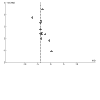
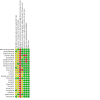
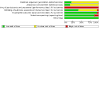
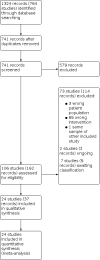
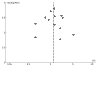
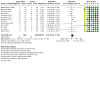
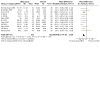
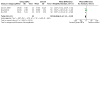
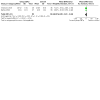

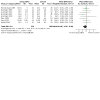
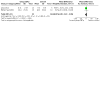
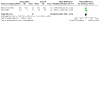
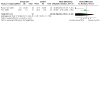
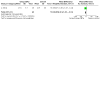
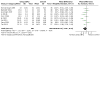
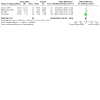
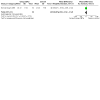
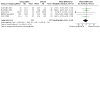
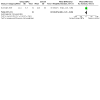
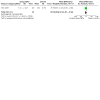
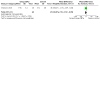
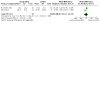
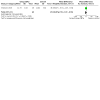
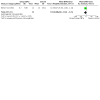
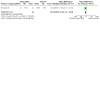
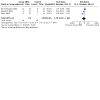
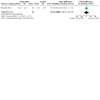
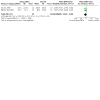
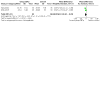
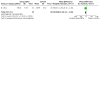
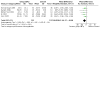
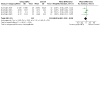
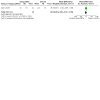
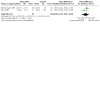
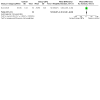
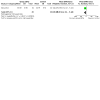
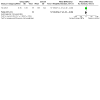
Update of
- doi: 10.1002/14651858.CD009608
Similar articles
-
Cognitive behavioural therapy plus standard care versus standard care for persistent aggressive behaviour or agitation in people with schizophrenia.Cochrane Database Syst Rev. 2023 Jul 25;7(7):CD013511. doi: 10.1002/14651858.CD013511.pub2. Cochrane Database Syst Rev. 2023. PMID: 37490701 Free PMC article.
-
Clozapine dose for schizophrenia.Cochrane Database Syst Rev. 2017 Jun 14;6(6):CD009555. doi: 10.1002/14651858.CD009555.pub2. Cochrane Database Syst Rev. 2017. PMID: 28613395 Free PMC article.
-
Sertindole for schizophrenia.Cochrane Database Syst Rev. 2005 Jul 20;2005(3):CD001715. doi: 10.1002/14651858.CD001715.pub2. Cochrane Database Syst Rev. 2005. PMID: 16034864 Free PMC article.
-
Mirtazapine adjunct for people with schizophrenia.Cochrane Database Syst Rev. 2018 May 26;5(5):CD011943. doi: 10.1002/14651858.CD011943.pub2. Cochrane Database Syst Rev. 2018. PMID: 29802811 Free PMC article.
-
Selective noradrenaline reuptake inhibitors for schizophrenia.Cochrane Database Syst Rev. 2018 Jan 25;1(1):CD010219. doi: 10.1002/14651858.CD010219.pub2. Cochrane Database Syst Rev. 2018. PMID: 29368813 Free PMC article.
Cited by
-
Metacognitive training (MCT) for psychosis: a systematic review and grade recommendations.Eur Psychiatry. 2025 May 26;68(1):e80. doi: 10.1192/j.eurpsy.2025.10027. Eur Psychiatry. 2025. PMID: 40415540 Free PMC article.
-
Evidence-based psychosocial interventions in schizophrenia: a critical review.Curr Opin Psychiatry. 2024 May 1;37(3):131-139. doi: 10.1097/YCO.0000000000000925. Epub 2024 Feb 15. Curr Opin Psychiatry. 2024. PMID: 38410981 Free PMC article. Review.
-
Clinical value and mechanistic analysis of HIIT on modulating risk and symptoms of depression: A systematic review.Int J Clin Health Psychol. 2024 Jan-Mar;24(1):100433. doi: 10.1016/j.ijchp.2023.100433. Epub 2024 Jan 9. Int J Clin Health Psychol. 2024. PMID: 38226005 Free PMC article.
-
Psychosocial and psychological interventions for schizophrenia relapse prevention: A bibliometric analysis.Glob Ment Health (Camb). 2024 Apr 12;11:e49. doi: 10.1017/gmh.2024.49. eCollection 2024. Glob Ment Health (Camb). 2024. PMID: 38690569 Free PMC article.
-
Computerized cognitive remediation therapy on cognitive impairment and social function in patients with chronic schizophrenia.World J Psychiatry. 2024 Jun 19;14(6):884-893. doi: 10.5498/wjp.v14.i6.884. eCollection 2024 Jun 19. World J Psychiatry. 2024. PMID: 38984329 Free PMC article.
References
References to studies included in this review
Barrowclough 2006 {published data only}Std10252
-
- Barrowclough C, Haddock G, Lobban F, Jones S, Siddle R, Roberts C, et al. Group cognitive behavioural therapy for schizophrenia – randomised controlled trial. British Journal of Psychiatry 2006;189:527-32. [CSZG: Ref14559] - PubMed
-
- Barrowclough C. An evaluation of the effectiveness of group cognitive therapy for people with recent onset schizophrenia. National Research Register 2001;1. [CSZG: Ref12948]
Bechdolf 2004 {published data only}Std7953
-
- Bechdolf A, Knost B, Kuntermann C, Schiller S, Hambrecht M, Klosterkotter J, et al. Coping-oriented versus psychoeducational group therapy for post acute patients with schizophrenia: results of a 6 month follow-up. Schizophrenia Research 2002;53(Suppl 1):263-4. [CSZG: Ref8053]
-
- Bechdolf A, Knost B, Kuntermann C, Schiller S, Klosterkotter J, Hambrecht M, et al. A randomized comparison of group cognitive behavioural therapy and group psychoeducation in patients with schizophrenia. Acta Psychiatrica Scandinavica 2004;110:21-8. [CSZG: Ref11268] - PubMed
-
- Bechdolf A, Knost B, Nelson B, Schneider N, Veith V, Yung AR, et al. Randomized comparison of group cognitive behaviour therapy and group psychoeducation in acute patients with schizophrenia: effects on subjective quality of life. Australian and New Zealand Journal of Psychiatry 2010;44:144-50. [CSZG: Ref19694] - PubMed
-
- Bechdolf A, Kohn D, Knost B, Pukrop R, Klosterkotter J. A randomized comparison of group cognitive-behavioural therapy and group psychoeducation in acute patients with schizophrenia: outcome at 24 months. Acta Psychiatrica Scandinavica 2005;112:173-9. [CSZG: Ref18491] - PubMed
-
- Bechdolf A. A randomized comparison of group cognitive-behavioural therapy and group psychoeducation in patients with schizophrenia: commentary reply. Acta Psychiatrica Scandinavica 2006;113:73-4. [CSZG: Ref18490] - PubMed
Chadwick 2016 {published data only}
Daniels 1998 {published data only}
Deng 2014 {published data only}
-
- Deng M, Ding N. Observation on the effect of implementing group CBT for patients with schizophrenia during rehabilitation [对精神分裂症康复期患者实施团体cbt的效果观察]. Contemporary Nurse 2014;10:116-8.
Granholm 2007 {published data only}Std10881
-
- Granholm E, McQuaid JR, McClure FS, Auslander LA, Perivoliotis D, Pedrelli P, et al. A randomized, controlled trial of cognitive behavioral social skills training for middle-aged and older outpatients with chronic schizophrenia. American Journal of Psychiatry 2005;162:520-9. [CSZG: Ref11453] - PubMed
-
- Granholm E, McQuaid JR, McClure FS, Link PC, Perivoliotis D, Gottlieb JD, et al. Randomized controlled trial of cognitive behavioral social skills training for older people with schizophrenia: 12-month follow-up. Journal of Clinical Psychiatry 2007;68:730-7. [CSZG: Ref14560] - PubMed
Granholm 2013 {published data only}Std10343
-
- Granholm E, Holden J, Link PC, McQuaid JR, Jeste DV. Randomized controlled trial of cognitive behavioral social skills training for older consumers with schizophrenia: defeatist performance attitudes and functional outcome. American Journal of Geriatric Psychiatry 2013;21(3):251-62. [CSZG: Ref28246] - PMC - PubMed
-
- NCT00237796. Functional rehabilitation of older patients with schizophrenia. www.clinicaltrials.gov/ct2/show/NCT00237796 (first received 12 October 2005).
Granholm 2014 {published data only}
Granholm 2020 {published data only}
-
- Granholm E, Holden JL, Dwyer K, Link P. Mobile-assisted cognitive-behavioral social skills training in older adults with schizophrenia. Journal of Behavioral and Cognitive Therapy 2020;30:13-21.
Guan 2016 {published data only}
-
- Guan T, Yang D, Han P. The effect of olanzapine combined with group therapy on paranoid schizophrenia [奥氮平合并团体治疗对偏执型精神分裂症的影响]. Modern Chinese Doctor 2016;54:58-61.
Jones 2014 {published data only}
-
- Jones A. Targeting Reasoning Biases in Delusions; a Pilot Study of the 'Thinking Well Group' [Doctoral thesis]. London (UK): King's College, 2014.
Li 2013a {published data only}
-
- Li X, Guo Y, Fu C, Chen L, Zhang Z. Group cognitive behavioral therapy efficacy for refractory auditory hallucinations in schizophrenia [小组认 知行 为治疗对 精神分裂症顽 固性幻 听的疗效 观察]. Chinese Journal of Rehabilitation 2013;28:313-5.
Li 2013b {published data only}
-
- Li J, Deng X, Xie Y, Liang L. Effects on cognitive function in patients with chronic schizophrenia, cognitive behavioral therapy [认知行为治疗对慢性精神分裂症患者认知功能的影响]. Chinese and foreign medical research 2013;24:130-2.
Mortan Sevi 2020 {published data only}
-
- Mortan Sevi O, Tekinsav Sutcu S, Yesilyurt S, Turan Eroglu S, Gunes B. Comparison of the effectiveness of two cognitive-behavioral group therapy programs for schizophrenia: results of a short-term randomized control trial. Community Mental Health Journal 2020;56:222-8. - PubMed
Penn 2009 {published data only}Std13558
-
- Penn D. A 24-week investigation of group cognitive behavioral therapy (CBT) for medication-resistant auditory hallucinations in 60 patients. Stanley Foundation Research Programs 2004.
-
- Penn DL, Meyer PS, Evans E, Wirth RJ, Cai K, Burchinal M. A randomized controlled trial of group cognitive-behavioral therapy vs. enhanced supportive therapy for auditory hallucinations. Schizophrenia Research 2009;109:52-9. [CSZG: Ref18213] - PubMed
Qi 2012 {published data only}
-
- Qi H, Liu H. Studies on the efficacy of combining episode male schizophrenic cognitive behavioral therapy [结合认知行为治疗对首发男性精神分裂症的 疗效研究]. Hebei Medical Journal 2012;34:3229-31.
Qu 2016 {published data only}
-
- Qu W. Exploring the impact of cognitive psychotherapy applied to patients with schizophrenia on their cognitive function [探析认知心理治疗应用于精神分裂症患者中对其认知功能的影响]. Psychologist 2016;22:32-3.
Shen 2007 {published data only}
-
- Shen F, Yang YC, Deng H. The effect of group cognitive-behavioural therapy for schizophrenia after acute episode. West China Medical Journal 2007;22:236-7.
Shi 2015 {published data only}
-
- Shi Y, Jiao Y, Jiang L, Sun Y, Bai Z, Wu Q, et al. The effect of cognitive behavioral therapy on executive function of patients with chronic schizophrenia [认知行为治疗对慢性精神分裂症患者执行功能的影响]. Neurological diseases and mental health 2015;15:497-9.
Song 2012 {published data only}
-
- Song X, Lui Y, Zhang Y, Zhou L. Study on the effect of cognitive behavioral therapy on improving the negative symptoms of schizophrenia patients [认知行为治疗对改善精神分裂症病人阴性症状的效果研究]. Psychologist 2012;7:30-1.
Song 2014 {published data only}
-
- Song X, Li J, Zhang Y, Wang X, Wang E. Group CBT for patients with schizophrenia and auditory hallucinations: the impact of quality of life [团体cbt对精神分裂症幻听患者生存质量的影响]. International Medicine and Health Guidance News 2014;20:2572-4.
Tao 2015 {published data only}
-
- Tao C, Ding S, Zhu Y, Li X. Evaluation of comprehensive family knowledge, belief and behavior intervention on the rehabilitation efficacy of schizophrenia patients in the rehabilitation period [家庭综合知信行干预对康复期精神分裂症患者康复疗效的评价]. China Journal of Health Psychology 2015;23:970-2.
Wykes 2005 {published data only}Std10290
-
- Wykes T, Hayward P, Thomas N, Green N, Surguladze S, Fannon D, et al. What are the effects of group cognitive behaviour therapy for voices? A randomised control trial. Schizophrenia Research 2005;77:201-10. [CSZG: Ref17574] - PubMed
-
- Wykes T, Parr AM, Landau S. Group cognitive treatment for persistent auditory hallucinations: a controlled trial. Schizophrenia Research 1999;36:335.
-
- Wykes T, Thompson N, Green N, Surgaldze S, Hayward P. Changing voices: a randomised control trial of group cognitive behavioural treatment. Schizophrenia Research 2003;60:331.
-
- Wykes T, Thompson N, Hayward P. Changing voices: a randomised control trial of group cognitive treatment. Schizophrenia Research 2002;53(Suppl 1):12. - PubMed
Zhou 2015 {published data only}
-
- Zhou JJ. The effect of cognitive behavior therapy on the social function and life quality of schizophrenia patients [认知行为疗法对精神分裂症患者社会功能和生活质量的影响]. Health Research 2015;35:539-41.
References to studies excluded from this review
Ace 2004 {published data only}
-
- Allott K, Alvarez-Jimenez M, Killackey EJ, Bendall S, McGorry PD, Jackson HJ. Patient predictors of symptom and functional outcome following cognitive behaviour therapy or befriending in first-episode psychosis. Schizophrenia Research 2011;132(2-3):125-30. - PubMed
-
- Bendall S, Allott K, Jovev M, Marois MJ, Killackey EJ, Gleeson JF, et al. Therapy contamination as a measure of therapist treatment adherence in a trial of cognitive behaviour therapy versus befriending for psychosis. Behavioural and Cognitive Psychotherapy 2015;43(3):314-27. - PubMed
-
- Bendall S, Jackson HJ, Killackey E, Allott K, Johnson T, Harrigan S, et al. The credibility and acceptability of befriending as a control therapy in a randomized controlled trial of cognitive behaviour therapy for acute first episode psychosis. Behavioural and Cognitive Psychotherapy 2006;34(3):277-91.
-
- Bendall S. A comparison of the nonspecific effects of a control treatment with cognitive behavioural therapy in first episode psychosis. Schizophrenia Research 2004;70(1):71.
-
- Jackson H, McGorry P, Killackey E, Bendall S, Allott K, Johnston T, et al. The ACE project: a randomised controlled trial of CBT versus befriending: acute phase results. Schizophrenia Research 2004;70(1):56-7.
Ahuir 2018 {published data only}
-
- Ahuir M, Cabezas A, Minano MJ, Algora MJ, Estrada F, Sole M, et al. Improvement in cognitive biases after group psychoeducation and metacognitive training in recent-onset psychosis: a randomized crossover clinical trial. Psychiatry Research 2018;270:720-3. - PubMed
Allott 2011 {published data only}
-
- Allott KA, Alvarez-Jimenez M, Bendall S, Killackey EJ, McGorry PD, Jackson HJ. Predictors of functional outcome following CBT in first-episode psychosis. Schizophrenia Bulletin 2011;37:258. - PubMed
Bruns 1992 {published data only}
-
- Bruns U, Franzen U, Hornung WP, Klingberg S, Wiesemann C. Effects of an ambulant group therapy program on psychosocial adaptation of chronic schizophrenic outpatients. Schizophrenia Research 1992;6(2):175.
Chen 2012 {published data only}
-
- Chen R. Analysis of the effect of cognitive behavioral psychological intervention on the rehabilitation of chronic schizophrenia [认知行为心理干预对慢性精神分裂症康复作用分析]. Guide of Chinese Medicine 2012;11:57-8.
Collins 2007 {published data only}
-
- Collins LM, Granholm E, McQuaid JR. Clinical insight moderates treatment outcome in cognitive behavioral social skills training for chronic schizophrenia. Schizophrenia Bulletin 2007;33:426.
Freeman 1998 {published data only}
-
- Freeman D, Garety P, Fowler D, Kuipers E, Dunn G, Bebbington P, et al. The London East Anglia randomized controlled trial of cognitive behaviour therapy for psychosis. IV: self esteem and persecutory delusions. British Journal of Clinical Psychology 1998;37(4):415-30. - PubMed
Granholm 2011 {published data only}
-
- Dwyer K, Holden J, Granholm E. Can individuals with neurocognitive impairment benefit from cognitive-behavioral social skills training? Schizophrenia Bulletin 2019;45:S218.
-
- Granholm E, Holden J, Link P. Randomized clinical trial of cognitive behavioral social skills training (CBSST) for older people with schizophrenia: replication and role of defeatist attitudes. Schizophrenia Bulletin 2011;37:304.
Hornung 1993 {published data only}
-
- Buchkremer G, Klingberg S, Holle R, Monking HS, Hornung WP. Psychoeducational psychotherapy for schizophrenic patients and their key relatives or care-givers: results of a 2-year follow-up. Acta Psychiatrica Scandinavica 1997;96:483-91. - PubMed
-
- Feldmann R, Buchkremer G, Hornung WP. Prognostic and therapeutic relevance of cognitive characteristics for the long-term course of schizophrenic illness following psychoeducational psychotherapeutic treatment [Prognostische und therapeutische relevanz kognitiver ressourcen fur den langzeitverlauf schizophrener erkrankung nach psychoedukativ-psychotherapeutischer behandlung]. Fortschritte der Neurologie und Psychiatrie 2000;68:54-60. - PubMed
-
- Feldmann R, Hornung WP, Buchkremer G, Arolt V. The influence of familial loading on the course of schizophrenic symptoms and the success of psychoeducational therapy. Psychopathology 2001;34(4):192-7. - PubMed
-
- Feldmann R, Hornung WP, Prein B, Buchkremer G, Arolt V. Timing of psychoeducational psychotherapeutic interventions in schizophrenic patients. European Archives of Psychiatry and Clinical Neuroscience 2002;252:115-9. - PubMed
-
- Hornung WP, Buchkremer G, Redbrake M, Klingberg S. Patient modified treatment. What are the effects of neuroleptic drugs on people with schizophrenia? [Patientmodifizierte Medikation: Wie gehen schizophrene Patienten mit ihren Neuroleptika um?]. Nervenarzt 1993;64:434-439. - PubMed
Hu 2016 {published data only}
-
- Hu X, Yan G, Chen J. The effect of cognitive behavioral therapy on improving the quality of life of patients with schizophrenia [认知行为治疗对改善精神分裂症患者生活质量的效果]. Laboratory Medicine and Clinical 2016;13:822-4.
Huang 2010 {published data only}
-
- Huang J, Guo J, Han S. Influence of cognitive behavior training on rehabilitation effect of chronic schizophrenia patients [认 知行 为训 练对 精 神分 裂症 病 人康复效 果影 响的研 究]. Chinese Nursing Research 2010;24:1260-1.
Huang 2014 {published data only}
-
- Huang S, Wang J. Application analysis of cognitive therapy in 120 patients with schizophrenia in remission [认知治疗在120例精神分裂症缓解期患者中的应用分析]. Guide of Chinese Medicine 2014;12:115-6.
ISRCTN37178153 {published data only}
-
- ISRCTN37178153. The effect of a cognitive behavioural program called "Michael's Game" on psychotic symptoms. www.isrctn.com/ISRCTN37178153 (first received 6 April 2013).
-
- Penzenstadler L, Chatton A, Huguelet P, Lecardeur L, Bartolomei J, Brazo P, et al. Does change over time in delusional beliefs as measured with PDI predict change over time in belief flexibility measured with MADS? Psychiatric Quarterly 2010;90(4):693-702. - PubMed
-
- Penzenstadler L, Chatton A, Lecomte T, Huguelet P, Lecardeur L, Azoulay S, et al. Does the Beck Cognitive Insight Scale predict change in delusional beliefs? Psychology and Psychotherapy 2020;93(4):690-704. - PubMed
ISRCTN50247539 {published data only}
-
- ISRCTN50247539. Reflex. www.isrctn.com/ISRCTN50247539 (first received 4 May 2009).
-
- Pijnenborg GH, Vos AE, Timmerman ME, Gaag M, Sportel BE, Arends J, et al. Social cognitive group treatment for impaired insight in psychosis: a multicenter randomized controlled trial. Schizophrenia Research 2019;206:362-9. - PubMed
ISRCTN95603741 {published data only}
-
- Feasibility study of culturally adapted cognitive behaviour therapy for psychosis for ethnic minority groups. www.isrctn.com/ISRCTN95603741 (first received 21 May 2010).
-
- Husain N, Mehmood N, Husain MO, Kiran T, Naeem F, Chaudhry IB. Feasibility study of culturally adapted cognitive behaviour therapy for psychosis in Pakistan. European Psychiatry 2016;33:S578-9.
-
- Phiri P. Adapting cognitive behaviour therapy for psychosis for black and minority ethnic communities. Dissertation Ann Arbor University of Southampton (United Kingdom) 2012.
Jia 2005 {published data only}
-
- Jia Y, Lou F, Feng M. Cognitive behavioral nursing therapy for patients with schizophrenia [精神分裂症 患者认 知行 为护理疗法探讨]. Journal of Nursing Science 2005;20:10-2.
Jiang 2005 {published data only}
-
- Jiang Y. Cognitive behavioral therapy term effect of the episode schizophrenia [认知行为治疗对首发精神分裂症近期疗效的影响]. In: Proceedings of the 2005 Zhejiang Psychiatry Annual Conference. 2005:284-6.
Jiang 2008 {published data only}
-
- Jiang JF, Wei JY, Bian MJ, Xu YF, Gu JY. Effect of cognitive behavioral intervention on recovery of social function of patients with schizophrenia [认知行为干预对精神分裂症患者恢复 社会功能 的作 用]. Heilongjiang Nursing Journal 2008;14:701-2.
Johnson 2008 {published data only}
-
- Johnson DP, Penn DL, Bauer DJ, Meyer P, Evans E. Predictors of the therapeutic alliance in group therapy for individuals with treatment-resistant auditory hallucinations. British Journal of Clinical Psychology 2008;47:171-83. - PubMed
Kaizerman‐Dinerman 2018 {published data only}
-
- Kaizerman-Dinerman A, Josman N, Roe D. The use of cognitive strategies among people with schizophrenia: a randomized comparative study. Open Journal of Occupational Therapy 2019;7:1-12.
-
- Kaizerman-Dinerman A, Roe D, Josman N. An efficacy study of a metacognitive group intervention for people with schizophrenia. Psychiatry Research 2018;270:1150-6. - PubMed
Klingberg 2010 {published data only}
-
- Klingberg S, Wittorf A, Fischer A, Jakob-Deters K, Buchkremer G, Wiedemann G. Evaluation of a cognitive behaviourally oriented service for relapse prevention in schizophrenia. Acta Psychiatrica Scandinavica 2010;121:340-50. - PubMed
Landa 2018 {published data only}
-
- Landa Y, Mueser K, Jacobs M, Jespersen R, Wyka K, Swiderski C, Cahalan C, et al. Group and family based cognitive behavioral therapy for youth at risk for psychosis: from research to real-word practice. Early Intervention in Psychiatry 2018;12(Suppl 1):183.
Langer 2012 {published data only}
-
- Langer AI, Cangas AJ, Salcedo E, Fuentes, B. Applying mindfulness therapy in a group of psychotic individuals: a controlled study. Behavioural and Cognitive Psychotherapy 2012;40(1):105-9. - PubMed
Lecomte 2002 {published data only}
-
- Lecomte T, Leclerc C, Corbiere M, Wykes T, Wallace CJ, Spidel A. Group cognitive behavior therapy or social skills training for individuals with a recent onset of psychosis? Results of a randomized controlled trial. Journal of Nervous and Mental Disease 2008;196:866-75. - PubMed
-
- Lecomte T, Leclerc C, Wykes T, Spidel A. Group CBT for early psychosis – are there still benefits 1 year later? Early Intervention in Psychiatry 2010;4(Suppl 1):150.
-
- Lecomte T, Leclerc C, Wykes T, Wallace CJ, Spidel A, Corbiere M. Group CBT versus skills training for first episodes of psychosis – results of a RCT. Schizophrenia Research 2006;86(Suppl 1):S45-6.
-
- Lecomte T, Leclerc C, Wykes T, Wallace CJ, Spidel A, Greaves C. Effectiveness of group cognitive-behaviour therapy for first episode psychosis – results of a randomized controlled trial. Schizophrenia Bulletin 2007;33:440.
-
- Lecomte T, Leclerc C, Wykes T, Wallace CJ. Group CBT versus group symptom management for treating psychotic symptoms of young individuals presenting a first episode of schizophrenia: preliminary results. In: Proceedings of the 3rd International Conference on Early Psychosis; 2002 Sep 25-28; Copenhagen, Denmark. 2002:88-9.
Lecomte 2020 {published data only}
-
- Lecomte T, Corbiere M, Giguere CE, Titone D, Lysaker P. Group cognitive behaviour therapy for supported employment – results of a randomized controlled cohort trial. Schizophrenia Research 2020;215:126-33. - PubMed
Li 2005 {published data only}
-
- Li Y, Li Z, Xin L, Hou L, Zhao Y, Hou C. The efficacy of special cognitive-behavior approaches on schizophrenia during acute-phase [特 定 认 知 行 为 技 术 对 急 性 期 精 神 分 裂 症 的 干 预 效 果]. Hebei Medicine 2005;21:1018-20.
Li 2007 {published data only}
-
- Li S, Su M, Su T, Wang C, Ling H, Cheng G. The effect of cognition therapy on the insight and the compliance of schizophrenia patients [认知领 影响 悟治疗对精神分裂症患者 自知力及治疗依从性的]. International Medicine and Health Guidance News 2007;13:18-21.
Li 2009 {published data only}
-
- Li X. The impact of cognitive intervention on the rehabilitation of patients with split mental disorder [认 知 干 预 对 精 神 分 裂 症 患 者 康 复 的 影 响]. Journal of Qilu Nursing 2009;15:11-2.
Li 2014a {published data only}
-
- Li L, Hu L, Liang Z, Wen Z. The effect of cognitive intervention on the quality of life and related factors in patients with chronic schizophrenia [认知干预对慢性精神分裂症患者生活质量及相关因素的影响]. Clinical Medical Engineering 2014;21:1073-4.
Li 2014b {published data only}
-
- Li H. The effect of cognitive psychotherapy on the treatment compliance of patients with first episode schizophrenia [认知心理治疗对首发精神分裂症患者治疗依从性的影响]. Medical Information 2014;27:524.
Li 2014c {published data only}
-
- Li Y. The clinical effect of cognitive therapy in the treatment of schizophrenia and its influence on social function [认知疗法在精神分裂症患者治疗中的临床疗效及对社会功能的影响]. Medical Journal of Chinese People's Health 2014;26:38-9.
Liang 2002 {published data only}
-
- Liang Q, He Z, Deng L, Lu H. Cognitive therapy to improve the efficacy of schizophrenia insight analysis [认知治疗对改善精神分裂症患者自知力的疗效分析]. Modern Rehabilitation 2002;6:3234.
Lincoln 2011 {published data only}
-
- Lincoln T, Ziegler M, Mehl S, Luellmann E, Kesting ML, Westermann S, et al. Effectiveness of CBT in a German outpatient setting. Short and long term results of a controlled randomised trial. European Archives of Psychiatry and Clinical Neuroscience 2011;261:S18.
Liu 2012 {published data only}
-
- Liu G. The effect of cognitive psychotherapy on the quality of life and stigma of patients with schizophrenia during rehabilitation [认知心理治疗对精神分裂症康复期患者生活质量及病耻感的影响]. Psychologist 2012;8:71.
Liu 2015 {published data only}
-
- Liu J, Yong S, Xu X, Zhang J, Xie P, Xu C, et al. The effect of cognitive behavioral therapy on the rehabilitation of inpatients with schizophrenia [认知行为治疗对住院精神分裂症患者康复效果的影响]. Journal of Clinical Psychosomatic Diseases 2015;21:64-6.
Long 2001 {published data only}
-
- Long R, Li L. Cognitive behavioral therapy in the psychological care work (control analysis of 100 cases of schizophrenia) [认知行为疗法在 心理护理工作 中的应用 (附 100例住院精神分裂症对照分析]. Shandong Archives of Psychiatry 2001;14:261-3.
Luo 2010 {published data only}
-
- Luo H, Wu X. Episode schizophrenia patients with cognitive therapy follow-up study [首发精神分裂症患者认知治疗疗效随访研究]. Internal Medicine of China 2010;5:272-4.
Ma 2007 {published data only}
-
- Ma WH, Hu XF, Wang ZQ. A comparison of schizophrenic treated with method of corrected – behavior [精神分裂症认知行为疗法的对照研究]. Medical Journal of Chinese People's Health 2007;19:441, 443.
Ma 2012 {published data only}
-
- Ma Y, Li ZJ, Xu ZY, Gu ZH, Qu Y, Wang XQ, et al. Effects of cognitive behavioral therapy on quality of life in patients with schizophrenia: a single blind randomized controlled study [认知行为治疗改善精神分裂症患者 生活质量的随机单盲对照试验]. Chinese Mental Health Journal 2012;26:801-7.
Ma 2013 {published data only}
-
- Ma Y, Li Z, Xu Z, Guo Z, Qu Y, Wang X, et al. Effects of cognitive behavioral therapy on coping style for patients with schizophrenia [认知行为治疗对精神分裂症患者应对方式的影响]. Chinese Journal of Clinical Psychology 2013;21:455-7.
Mo 2015 {published data only}
-
- Mo Y, Li X, Fu C, He R, Cai Y, Mo T. The influence of cognitive behavior intervention on the mental state of vagrants with mental illness [认知行为干预对流浪精神疾病患者心理状态的影响]. Chinese Journal of Modern Drug Application 2015;9:201-2.
NCT01704833 {published data only}
-
- Landa Y, Chadwick P, Beck AT, Alexeenko L, Sheets M, Zhu Y, et al. Targeting information processing biases and social avoidance in group cognitive behavioral therapy for paranoia: a pilot randomized controlled clinical trial. Schizophrenia Bulletin 2011;37:271.
-
- Landa Y, Chadwick P, Stern E, Pan H, Alexeenko L, Zhu Y, et al. Cognitive behavioral therapy for paranoia: a pilot randomized controlled clinical trial and fMRI investigation of systems-level brain circuit modulation. Biological Psychiatry 2012;8(Suppl 1):65S-6S.
-
- NCT01704833. Cognitive behavioral therapy for paranoia in schizophrenia. clinicaltrials.gov/ct2/show/NCT01704833 (first received 11 October 2012).
NCT02254733 {published data only}
Nie 2016 {published data only}
-
- Nie S, Deng L, Yang Y, Zhou Y. The effect of cognitive behavioral intervention on treatment compliance and quality of life of patients with schizophrenia in remission [认知行为干预对精神分裂症缓解期患者治疗依从性和生活质量的影响]. Chinese Clinical Nursing 2016;8:461-4.
Owen 2015 {published data only}
-
- Owen M, Sellwood W, Kan S, Murray J, Sarsam M. Group CBT for psychosis: a longitudinal, controlled trial with inpatients. Behaviour Research and Therapy 2015;65:76-85. - PubMed
Park 2013 {published data only}
-
- Park H. A randomized controlled pilot study of CBSST (cognitive behavioral social skills training) for middle-or older-aged patients with schizophrenia: a pilot study, revisited cognitively. International Psychogeriatrics 2013;25(Suppl 1):159.
Pijnenborg 2013 {published data only}
-
- Pijnenborg G, Vos A, Meer L, Sportel E, Bockting C, Gaag M, Aleman A. Results of a metacognitive group treatment to improve insight in psychosis (correct version of the abstract, this replaces the previously submitted abstract on reflex). Schizophrenia Research 2014;153(Suppl 1):S354.
-
- Pijnenborg G, Vos A, Meer L, Sportel E, Bockting C, Gaag M, et al. A metacognitive group treatment to improve insight in psychosis. Schizophrenia Research 2014;153(Suppl 1):S162.
-
- Pijnenborg M, Vos A, Meer L, Bockting C, Gaag M, Aleman A. A metacognitive group treatment to improve insight in psychosis and to reduce self-stigma. European Archives of Psychiatry and Clinical Neuroscience 2015;1:S72.
-
- Pijnenborg M, Meer L, Vos A, Bockting C, Gaag M, Aleman A. A metacognitive group treatment to improve insight in psychosis. Schizophrenia Bulletin 2013;39:S349.
Pu 2016 {published data only}
-
- Pu X, Wang Y. The effect of cognitive behavioral therapy on the coping style of patients with schizophrenia [认知行为治疗对精神分裂症患者应对方式的影响]. Health today 2016;15:87.
Puig‐Navarro 2020 {published data only}
-
- Puig-Navarro O, Badia F, Baeza I, Varela E, Sugranyes G, Garcia-Rizo C, et al. Efficacy of cognitive-behavioral social skills training improving symptoms and functioning in patients with early-onset psychosis: a randomized controlled trial. Schizophrenia Bulletin 2020;46:S39.
Reddy 2019 {published data only}
-
- Reddy F, Glynn S, Green M. Group-augmented motivational interviewing + CBT for negative symptoms. Schizophrenia Bulletin 2019;45:118-9.
Rees 2015 {published data only}
Roncone 2004 {published data only}
-
- Roncone R, Mazza M, Frangou S, Risio A, Ussorio D, Tozzini C, et al. Rehabilitation of theory of mind deficit in schizophrenia: a pilot study of metacognitive strategies in group treatment. Neuropsychological Rehabilitation 2004;14:421-35.
Tan 2015 {published data only}
-
- Tan C, Ye H, Huang M, Zhang Y, Zhong L. The effect of cognitive behavioral intervention on patients with first episode schizophrenia [认知行为干预对首发精神分裂症患者的影响]. Qilu Nursing Journal 2015;21:36-8.
Tan 2016 {published data only}
-
- Tan Y. The effect of cognitive behavioral nursing therapy on the insight of schizophrenia [认知行为护理疗法对精神分裂症自知力的影响]. China Health and Nutrition 2016;1:51.
Tang 2007 {published data only}
-
- Tang X, Zou J, Lu X. Effect of cognitive-behavioral therapy on therapeutic effect of the first-episode schizophrenic patients during recovery period [对首发精神分裂症康复期患者实施认知行为干预的效果观察]. China Journal of Health Psychology 2007;15:588-9.
Tao 2016 {published data only}
-
- Tao Y. The effect of cognitive behavioral therapy on the social function of patients with schizophrenia during rehabilitation [认知行为疗法对康复期精神分裂症患者社会功能的影响]. Modern Chinese Doctor 2016;54:16-9.
Wang 2003 {published data only}
-
- Wang Y. The role of cognitive therapy to improve the understanding of schizophrenia and some capacity [认知治疗改善精神分裂症患者认识及 部分行为能力的作用]. Modern Rehabilitation 2003;7:91.
Wang 2004 {published data only}
-
- Wang H. Controlled study of cognitive behavioral psychological care for schizophrenia [认知行为心理护理对精神分裂症疗效的对照研究]. Chinese Clinical Medicine and Nursing 2004;5:10-1.
Wang 2012 {published data only}
-
- Wang C, An Q. The effect of cognitive behavioral therapy on the compliance behavior of patients with schizophrenia [认知行为治疗对精神分裂症患者遵医行为的影响]. Seek Medical Advice 2012;7:651.
Wang 2013 {published data only}
-
- Wang H, Chen Y, Xie W, Xiao B, Qiu C, Xie S. The effect of cognitive therapy on treatment compliance of outpatients with schizophrenia [认知治疗对门诊精神分裂症患者治疗依从性的影响]. Medical Journal of Chinese People's Health 2013;25:16-8.
Wang 2014 {published data only}
-
- Wang Z, Guo Z, Han G, Wang J, Li Z. The effect of cognitive behavioral therapy on patients with schizophrenia in the community [认知行为治疗对社区精神分裂症患者的疗效]. China Journal of Health Psychology 2015;23:16-9.
-
- Wang Z, Guo Z, Wang J, Yan G, Han G, Li Z. The impact of standardized cognitive behavioral therapy on the quality of life and social function of patients with residual schizophrenia in the community [规范化认知行为治疗对社区残留型精神分裂症患者生活质量和社会功能的影响]. Neurological Diseases and Mental Health 2014;14:495-6.
Wu 2008 {published data only}
-
- Wu N, Wang Q, Kong L. A controlled study of cognitive behaviour therapy in chronic schizophrenia [认知行为治疗慢性精神分裂症对照研究]. Journal of Clinical Psychosomatic Diseases 2008;14:206-7.
Wu 2013 {published data only}
-
- Wu L. Psychological intervention in patients with chronic schizophrenia and negative symptoms [心 理 干 预 在 慢 性 精 神 分 裂 症 阴 性 症 状 患 者]. Medical Journal of Chinese People's Health 2013;25:81-2.
Xia 2008 {published data only}
-
- Xia JX, Gao SN, Qing GX. The effect of cognitive treatment on compliance of patients with schizophrenia [认知治疗对精神分裂症患者服药依从性及复发的影响]. Chinese Journal of Prevention and Control of Chronic Non Communicable Diseases 2008;16:41-2.
Xie 2013 {published data only}
-
- Xie W, Xie Y, Xiao Y, Wang H, Xiao B. Schizophrenia patients multimedia to enhance the effect of cognitive intervention study [精神分裂症患者应用多媒体加强认知干预的效果研究]. Journal of Nursing 2013;20:57-9.
Yang 2010 {published data only}
-
- Yang C. Systemic cognitive intervention for first-episode schizophrenia patients: clinical observation of rehabilitation effect [系统化认知干预对首发精神分裂症患者 康复效果的临床观察]. Hebei Medical Journal 2010;32:417-8.
Zha 2015 {published data only}
-
- Zha W. The effect of cognitive insight therapy on medication compliance of patients with schizophrenia [认知领悟治疗对精神分裂症患者服药依从性的影响]. Shenzhen Journal of Integrated Traditional Chinese and Western Medicine 2015;25:26-7.
Zhang 1999 {published data only}
-
- Zhang Z, Yao S. Controlled study on the role of cognitive psychotherapy in the remission of paranoid schizophrenia [认知治疗对偏执型精神分裂症患者]. Chinese Mental Health Journal 1999;13:174-5.
Zhang 2014 {published data only}
-
- Zhang Y. The effect of cognitive behavioral intervention on medication compliance of hospitalized vagrant patients with mental illness during the recovery period [认知行为干预对恢复期住院流浪精神病患者服药依从性的影响]. Medical Journal of Chinese People's Health 2014;26:117-8.
Zhang 2015a {published data only}
-
- Zhang J. The clinical experience of cognitive correction in the treatment of schizophrenia [认知矫正治疗精神分裂症的临床体会]. Modern diagnosis and treatment 2015;26:2054-5.
Zhang 2015b {published data only}
-
- Zhang Y. Effect of cognitive behavior on coping style in patients with schizophrenia [认知 行为治疗对精神分裂症患者应对方式的影响]. World Latest Medicine Information 2015;13:63.
Zhang 2015c {published data only}
-
- Zhang H. Nursing observation on cognitive psychotherapy of psychotic patients in rehabilitation period [康复期精神病患者认知心理治疗的护理观察]. World Latest Medicine Information 2015;15:191-4.
Zhao 2014 {published data only}
-
- Zhao S, Wang J. A comparative study of cognitive behavioral therapy in the rehabilitation of patients with chronic schizophrenia [认知行为治疗对慢性精神分裂症患者康复疗效的对照研究]. Chinese Disability Medicine 2014;22:209-10.
References to studies awaiting assessment
Brenner 1987 {published data only}
-
- Brenner HD, Hodel B, Kube G, Roder V. Cognitive therapy with schizophrenics: analysis of the problem and experimental results. Nervenarzt 1987;58:72-83. - PubMed
Chung 2001 {published data only}
-
- Chung YC, Kim JH, Eun HB, Hwang IK. Effect of cognitive-behavioral therapy on the delusion in schizophrenic patients. Journal of the Korean Neuropsychiatric Association 2001;40:63-71.
Classen 1993 {published data only}
-
- Classen W, Krajewski C, Boesken S. Cognitive and social processes during art (AT) or cognitive (CT) therapy and a simultaneous CT + AT therapy in schizophrenics. Verhaltenstherapie 1993;Suppl 1:A45.
-
- Classen W, Krajewski C, Boesken S. Comparison of art and cognitive therapy (IPT) with simultaneous cognitive and art therapy for schizophrenic patients regarding the change of cognitive processes. Pharmacopsychiatry 1993;26:171.
Klingberg 2001 {published data only}
-
- Klingberg S, Wiedemann G, Buchkremer G. Cognitive-behavioural therapy for schizophrenic patients – design and preliminary results of a randomised effectiveness trial. Zeitschrift Für Klinische Psychologie Und Psychotherapie 2001;30:259-67.
Kraemer 1987 {published data only}
-
- Kraemer S, Sulz KH, Schmid R, Lassle R. Cognitive therapy of schizophrenic patients: a control study. Nervenarzt 1987;58:84-90. - PubMed
McLeod 2007 {published data only}
-
- McLeod T, Morris M, Birchwood M, Dovey A. Cognitive behavioural therapy group work with voice hearers. Part 1. British Journal of Nursing 2007;16:248-52. - PubMed
-
- McLeod T, Morris M, Birchwood M, Dovey A. Cognitive behavioural therapy group work with voice hearers. Part 2. British Journal of Nursing 2007;16:292-5. - PubMed
Shafiei 2011 {published data only}
-
- Shafiei Amiri M, Ahmadi Gatab T, Babakhani N. The efficacy of cognitive-behavior group therapy and social skill trainings on reduction of negative symptoms of schizophrenic patients. European Psychiatry 2011;26(Suppl 2):1327.
References to ongoing studies
IRCT 20180817040818N {published data only}
-
- IRCT 20180817040818N. The effect of cognitive-behavioral group training of self-care skills on positive, negative symptoms, general psychopathology and self-care in patients with schizophrenia. en.irct.ir/trial/47632 (first received 25 July 2020). [IRANIAN REGISTRY OF CLINICAL TRIAL: IRCT20180817040818N2]
NCT04144075 {unpublished data only}
-
- NCT04144075. Application of a mindfulness and self-compassion program in patients with schizophrenia. Randomized controlled trial (ACAMP2020). clinicaltrials.gov/ct2/show/NCT04144075 (first received 30 October 2019). [CLINICALTRIALS.GOV: NCT04144075]
Additional references
Altman 1996
Andreasen 1991
-
- Andreasen NC, Flaum M, Arndt S, Alliger R, Swayze VW. Positive and negative symptoms: assessment and validity. In: Marneros A, Andreasen NC, Tsuang MT, editors(s). Negative Versus Positive Schizophrenia. Berlin (Germany): Springer, 1991.
APA 1994
-
- American Psychiatric Association. Diagnostic and Statistical Manual of Mental Disorders (DSM-IV). 4th edition. Washington (DC): American Psychiatric Press, 1994.
APA 2000
-
- American Psychiatric Association. Diagnostic and Statistical Manual of Mental Disorders (DSM-IV-TR). 4th – revised edition. Washington (DC): American Psychiatric Press, 2000.
APA 2013
-
- American Psychiatric Association. Diagnostic and Statistical Manual of Mental Disorders (DSM-5). 5th edition. Washington (DC): American Psychiatric Press, 2013.
Barraclough 2006
-
- Barrowclough C, Haddock G, Lobban F, Jones S, Siddle R, Roberts C, et al. Group cognitive-behavioural therapy for schizophrenia: randomised controlled trial. British Journal of Psychiatry 2006;189:527-32. - PubMed
Beck 1979
-
- Beck AT, Rush A, Shaw B, Emery G. Cognitive Therapy of Depression. New York (NY): Guilford Press, 1979.
Beck 1990
-
- Beck AT, Steer RA. Manual for the Beck Anxiety Inventory. San Antonio (TX): Psychological Corporation, 1990.
Beck 1996
-
- Beck AT, Steer RA, Brown GK. Manual for the Beck Depression Inventory-II. San Antonio (TX): The Psychological Corporation, 1996.
Bighelli 2018
Birchwood 1990
-
- Birchwood M, Smith J, Cochrane R, Wetton S, Copestake S. The Social Functioning Scale. The development and validation of a new scale of social adjustment for use in family intervention programmes with schizophrenic patients. British Journal of Psychiatry 1990;157:853-9. - PubMed
Bland 1997
Boissel 1999
-
- Boissel JP, Cucherat M, Li W, Chatellier G, Gueyffier F, Buyse M, et al. The problem of therapeutic efficacy indices. Comparison of the indices and their use. Therapie 1999;54:405-11. - PubMed
Burlingame 2020
-
- Burlingame GM, Svien H, Hoppe L, Hunt I, Rosendahl J. Group therapy for schizophrenia: a meta-analysis. Psychotherapy (Chicago, Ill.) 2020;57:219-36. - PubMed
Butler 2006
-
- Butler AC, Chapman JE, Forman EM, Beck AT. The empirical status of cognitive-behavioural therapy: a review of meta-analyses. Clinical Psychology Review 2006;26:17-31. - PubMed
Charlson 2018
Covidence [Computer program]
-
- Covidence. Version accessed 2 March 2022. Melbourne, Australia: Veritas Health Innovation. Available at covidence.org.
Deeks 2000
-
- Deeks J. Issues in the selection for meta-analyses of binary data. In: Proceedings of the 8th International Cochrane Colloquium; 2000 Oct 25-28; Cape Town, South Africa. 2000.
Derogatis 1992
-
- Derogatis LR. SCL-90-R, Administration, Scoring and Procedures Manual-II for the R(evised) Version and Other Instruments of the Psychopathology Rating Scale Series. Townson (MD): Clinical Psychometric Research, 1992.
Dimeff 2007
-
- Dimeff LA, Koerner K. Dialectical Behavior Therapy in Clinical Practice: Applications Across Disorders and Settings. New York (NY): Guilford Press, 2007.
Divine 1992
-
- Divine GW, Brown JT, Frazier LM. The unit of analysis error in studies about physicians' patient care behavior. Journal of General Internal Medicine 1992;7:623-9. - PubMed
Donner 2002
-
- Donner A, Klar N. Issues in the meta-analysis of cluster randomized trials. Statistics in Medicine 2002;21:2971-80. - PubMed
Egger 1997
Eichner 2016
Elbourne 2002
-
- Elbourne DR, Altman DG, Higgins JP, Curtin F, Worthington HV, Vail A. Meta-analyses involving cross-over trials: methodological issues. International Journal of Epidemiology 2002;31:140-9. - PubMed
Fordham 2021
Furukawa 2006
-
- Furukawa TA, Barbui C, Cipriani A, Brambilla P, Watanabe N. Imputing missing standard deviations in meta-analyses can provide accurate results. Journal of Clinical Epidemiology 2006;59:7-10. - PubMed
Gledhill 1998
-
- Gledhill A, Lobban F, Sellwood W. Group CBT for people with schizophrenia: a preliminary evaluation. Behavioural and Cognitive Psychotherapy 1998;26:63-76.
GRADE Profiler [Computer program]
-
- GRADE Profiler. Version 3.2. GRADE Working Group, 2004.
Gulliford 1999
-
- Gulliford MC. Components of variance and intraclass correlations for the design of community-based surveys and intervention studies: data from the Health Survey for England 1994. American Journal of Epidemiology 1999;149:876-83. - PubMed
Haddock 1999
-
- Haddock G, McCarron J, Tarrier N, Faragher EB. Scales to measure dimensions of hallucinations and delusions: the Psychotic Symptom Rating Scales (PSYRATS). Psychological Medicine 1999;29:879-89. - PubMed
Hamilton 1959
-
- Hamilton M. The assessment of anxiety states by rating. British Journal of Medical Psychology 1959;32:50-5. - PubMed
Hamilton 1967
-
- Hamilton M. Development of a rating scale for primary depressive illness. British Journal of Social Psychology 1967;6:278-96. - PubMed
Hazell 2016
-
- Hazell CM, Hayward M, Cavanagh K, Strauss C. A systematic review and meta-analysis of low intensity CBT for psychosis. Clinical Psychology Review 2016;45:183-92. - PubMed
Heinrichs 1984
-
- Heinrichs DW, Hanlon TE, Carpenter WT Jr. The Quality of Life Scale: an instrument for rating the schizophrenic deficit syndrome. Schizophrenia Bulletin 1984;10:388-98. - PubMed
Hesdon 2004
-
- Hesdon B. Seeking Consensus on Adverse Effects on Cognitive Behaviour Therapy for Schizophrenia. Leeds (UK): University of Leeds, 2004.
Higgins 2003
Higgins 2022
-
- Higgins JP, Thomas J, Chandler J, Cumpston M, Li T, Page MJ, et al, editor(s). Cochrane Handbook for Systematic Reviews of Interventions Version 6.3 (updated February 2022). Cochrane, 2022. Available from www.training.cochrane.org/handbook.
Hoffman 2003
-
- Hoffman RE, Hawkins KA, Gueorguieva R, Boutros NN, Rachid F, Carroll K, et al. Transcranial magnetic stimulation of left temporoparietal cortex and medication-resistant auditory hallucinations. Archives of General Psychiatry 2003;60:49-56. - PubMed
Jauhar 2022
-
- Jauhar S, Johnstone M, McKenna PJ. Schizophrenia. Lancet 2022;399:473-86. - PubMed
Jones 2004
Jones 2010
Jones 2012
Jones 2018
Kay 1986
-
- Kay SR, Opler LA, Fiszbein A. Positive and Negative Syndrome Scale (PANSS) Manual. North Tonawanda (NY): Multi-Health Systems, 1986.
Kay 1987
-
- Kay SR, Fiszbein A, Opler LA. The Positive And Negative Syndrome Scale (PANSS) for schizophrenia. Schizophrenia Bulletin 1987;13:261-76. - PubMed
Kingdon 1998
-
- Kingdon D, Turkington D. Cognitive behaviour therapy of schizophrenia. In: Wykes T, Tarrier N, Lewis S, editors(s). Outcome and Innovation in Psychological Treatment of Schizophrenia. Bridgewater (NJ): Wiley, 1998.
Kingdon 2005
-
- Kingdon DG, Turkington D. Cognitive Therapy of Schizophrenia. New York (NY): Guilford Press, 2005.
Kopelovich 2019
-
- Kopelovich SL, Strachan E, Sivec H, Kreider V. Stepped care as an implementation and service delivery model for cognitive behavioral therapy for psychosis. Community Mental Health Journal 2019;55:755-67. - PubMed
Kurtz 2016
-
- Kurtz MM, Gagen E, Rocha NB, Machado S, Penn DL. Comprehensive treatments for social cognitive deficits in schizophrenia: a critical review and effect-size analysis of controlled studies. Clinical Psychology Review 2016;43:80-9. - PubMed
Lawrence 2006
-
- Lawrence R, Bradshaw T. Group cognitive behavioral therapy for schizophrenia: a systematic review of the literature. Journal of Psychiatric and Mental Health Nursing 2006;13:673-81. - PubMed
Laws 2018
Lecomte 2016
-
- Lecomte T, Leclerc C, Wykes T. Group CBT for psychosis. Oxford (UK): Oxford University Press, 2016.
Lefebvre 2019
-
- Lefebvre C, Glanville J, Briscoe S, Littlewood A, Marshall C, Metzendorf M, et al. Chapter 4: Searching for and selecting studies. In: Higgins JP, Thomas J, Chandler J, Cumpston M, Li T, Page MJ, et al, editors(s). Cochrane Handbook for Systematic Reviews of Interventions. 2nd edition. Chichester (UK): John Wiley and Sons, 2019:67-107. [DOI: 10.1002/9781119536604.ch4] - DOI
Leucht 2005a
-
- Leucht S, Kane JM, Kissling W, Hamann J, Etschel E, Engel R. Clinical implications of brief psychiatric rating scale scores. British Journal of Psychiatry 2005;187:366-71. - PubMed
Leucht 2005b
-
- Leucht S, Kane JM, Kissling W, Hamann J, Etschel E, Engel R. What does the PANSS mean? Schizophrenia Research 2005;79:231-8. - PubMed
Leucht 2007
Li 1994
-
- Li G, Hu X, Jin D, Tian W, Phillips M. A rating instrument for the evaluation of in-patient rehabilitation programmes in China: results of reliability and validity testing. British Journal of Psychiatry 1994;165:58-65. - PubMed
Liu 2005
-
- Liu Z, Gao B, Yuan S. The rating scale of social ability: development, and testing of reliability and validity. Chinese Journal of Clinical Psychology 2005;1:19-22.
Liu 2018
-
- Liu YC, Tang CC, Hung TT, Tsai PC, Lin MF. The efficacy of metacognitive training for delusions in patients with schizophrenia: a meta-analysis of randomized controlled trials informs evidence-based practice. Worldviews Evidence Based Nursing 2018;15:130-9. - PubMed
Lu 2009
-
- Lu W, Cui Y, Chen X, Zheng Y, Gu K, Cai H, et al. Changes in quality of life among breast cancer patients three years post-diagnosis. Breast Cancer Research and Therapy 2009;114:357-69. - PubMed
Marshall 2000
-
- Marshall M, Lockwood A, Bradley C, Adams CE, Joy C, Fenton M. Unpublished rating scales: a major source of bias in randomised controlled trials of treatments for schizophrenia. British Journal of Psychiatry 2000;176:249-52. - PubMed
McCutcheon 2020
-
- McCutcheon RA, Reis Marques T, Howes OD. Schizophrenia – an overview. JAMA Psychiatry 2020;77:201-10. - PubMed
Mc Glanaghy 2021
-
- Mc Glanaghy E, Turner D, Davis GA, Sharpe H, Dougall N, Morris P, et al. A network meta-analysis of psychological interventions for schizophrenia and psychosis: impact on symptoms. Schizophrenia Research 2021;228:447-59. - PubMed
Moher 2001
Montgomery 1979
-
- Montgomery SA, Asberg M. A new depression scale designed to be sensitive to change. British Journal of Psychiatry 1979;134:382-9. - PubMed
Moritz 2007
-
- Moritz S, Woodward TS. Metacognitive training in schizophrenia: from basic research to knowledge translation and intervention. Current Opinion in Psychiatry 2007;20:619-25. - PubMed
Morosini 2000
-
- Morosini PL, Magliano L, Brambilla L, Ugolini S, Pioli R. Development, reliability and acceptability of a new version of the DSM-IV Social and Occupational Functioning Assessment Scale (SOFAS) to assess routine social functioning. Acta Psychiatrica Scandinavica 2000;101:323-9. - PubMed
Morrison 2010
Mueser 2004
-
- Mueser KT, McGurk SR. Schizophrenia. Lancet 2004;362:2063-72. - PubMed
Muñoz 1993
-
- Muñoz RF, Miranda J . Group therapy manual for cognitive-behavioral treatment of depression. Revised. Unpublished manual, San Francisco General Hospital, Depression Oink, San Francisco 1993.
NICE 2014
-
- National Institute for Health and Care Excellence. Psychosis and Schizophrenia in Adults: Treatment and Management. London (UK): National Institute for Health and Care Excellence, 2014. - PubMed
Otto 2004
-
- Otto MW, Smits JA, Reese HE. Cognitive-behavioural therapy for the treatment of anxiety disorders. Journal of Clinical Psychiatry 2004;65:34-41. - PubMed
Overall 1962
-
- Overall JE, Gorham DR. The Brief Psychiatric Rating Scale. Psychological Reports 1962;10:799-812.
Pinto 2008
-
- Pinto A, Turkington G, Kingdon D. Cognitive behaviour therapy for psychosis: enhancing the therapeutic relationship to improve the quality of life. In: Cognitive Behaviour Therapy: a Guide for the Practising Clinician, Volume 2. London (UK): Routledge, 2008.
Pukrop 2000
-
- Pukrop R, Moller HJ, Steinmeyer EM. Quality of life in psychiatry. A systematic contribution to construct validation and the development of the integrative assessment tool modular system of quality of life. European Archives of Psychiatry and Clinical Neuroscience 2000;250:120-32. - PubMed
Review Manager 2014 [Computer program]
-
- Review Manager (RevMan). Version 5.3. Copenhagen: Nordic Cochrane Centre, The Cochrane Collaboration, 2014.
Roberts 2021
Schünemann 2021
-
- Schünemann HJ, Higgins JP, Vist GE, Glasziou P, Akl EA, Skoetz N, et al. Chapter 14: Completing 'Summary of findings' tables and grading the certainty of the evidence. In: Higgins JP, Thomas J, Chandler J, Cumpston M, Li T, Page MJ, et al, editor(s). Cochrane Handbook for Systematic Reviews of Interventions Version 6.2 (updated February 2021). Available from handbook: training.cochrane.org/handbook/archive/v6.2.
Shokraneh 2017
Shokraneh 2019
Shokraneh 2020
-
- Shokraneh F, Adams CE. Cochrane schizophrenia group’s study-based register of randomized controlled trials: development and content analysis. Schizophrenia Bulletin Open 2020;1:sgaa061. [DOI: 10.1093/schizbullopen/sgaa061] - DOI
Shokraneh 2021
Sitko 2020
-
- Sitko K, Bewick BM, Owens D, Masterson C. Meta-analysis and meta-regression of cognitive behavioral therapy for psychosis (CBTp) across time: the effectiveness of CBTp has improved for delusions. Schizophrenia Bulletin Open 2020;1:sgaa023.
Spencer 2020
-
- Spencer HM, Dudley R, Freeston MH, Turkington D. What are the essential ingredients of a CBT case conceptualization for voices and delusions in schizophrenia spectrum disorders? A study of expert consensus. Schizophrenia Research 2020;224:74-81. - PubMed
Stuart 1998
-
- Stuart GW. Cognitive behavioural therapy. In: Stuart GW, Sundeen SJ, editors(s). Principles and Practice of Psychiatric Nursing. 6th edition. London (UK): Mosby, 1998.
Tandon 2008
-
- Tandon R, Keshavan MS, Nasrallah HA. Schizophrenia, "just the facts" what we know in 2008. 2. Epidemiology and etiology. Schizophrenia Research 2008;102:1-18. - PubMed
Tarrier 1993
-
- Tarrier N, Beckett R, Harwood S, Baker A, Yusupoff L, Ugarteburu I. A trial of two cognitive-behavioural methods of treating drug-resistant residual psychotic symptoms in schizophrenic patients: I. Outcome. British Journal of Psychiatry 1993;162:524-32. - PubMed
Turkington 2006
-
- Turkington D, Dudley R, Warman DM, Beck AT. Cognitive-behavioural therapy for schizophrenia: a review. Journal of Lifelong Learning in Psychiatry 2006;2:223-33.
Ukoumunne 1999
-
- Ukoumunne OC, Gulliford MC, Chinn S, Sterne JA, Burney PG. Methods for evaluating area-wide and organisation-based intervention in health and health care: a systematic review. Health Technology Assessment 1999;3(5):1-75. - PubMed
van Oosterhout 2016
-
- Oosterhout B, Smit F, Krabbendam L, Castelein S, Staring AB, Gaag M. Metacognitive training for schizophrenia spectrum patients: a meta-analysis on outcome studies. Psychological Medicine 2016;46:47-57. - PubMed
van Os 2009
-
- Os J, Kapur S. Schizophrenia. Lancet 2009;374:635-45. - PubMed
Wallace 2000
-
- Wallace CJ, Liberman RP, Tauber R, Wallace J. The Independent Living Skills Survey: a comprehensive measure of the community functioning of severely and persistently mentally ill individuals. Schizophrenia Bulletin 2000;26:631-58. - PubMed
Waller 2011
Waller 2015
-
- Waller H, Emsley R, Freeman D, Bebbington P, Dunn G, Fowler D, et al. Thinking Well: a randomised controlled feasibility study of a new CBT therapy targeting reasoning biases in people with distressing persecutory delusional beliefs. Journal of Behavior Therapy and Experimental Psychiatry 2015;48:82-9. - PMC - PubMed
Watson 1969
-
- Watson D, Friend R. Measurement of social-evaluative anxiety. Journal of Consulting and Clinical Psychology 1969;33:448-57. - PubMed
WHOQOL Group 1994
-
- The WHOQOL Group. The development of the World Health Organization Quality of Life Assessment Instrument (the WHOQOL). In: Orley J, Kuyken W, editors(s). Quality of Life Assessment: International Perspectives. Berlin (Germany): Springer, 1994.
WHOQOL Group 1996
-
- The WHQOL Group. WHOQOL-BREF. Introduction, administration, scoring and generic version of the assessment: field trial version. apps.who.int/iris/handle/10665/63529 (accessed prior to 7 June 2022).
Williams 2002
-
- Williams CJ, Garland E. A cognitive-behavioural therapy assessment model for use in everyday clinical practice. Advances in Psychiatric Treatment 2002;8:172-9.
Wykes 1986
-
- Wykes T, Sturt E. The measurement of social behaviour in psychiatric patients: an assessment of the reliability and validity of the SBS schedule. British Journal of Psychiatry 1986;148:1-11. - PubMed
Wykes 1999
-
- Wykes T, Parr AM, Landau S. Group treatment of auditory hallucinations: exploratory study of effectiveness. British Journal of Psychiatry 1999;175:180-5. - PubMed
Xia 2009
-
- Xia J, Adams CE, Bhagat N, Bhagat V, Bhoopathi P, El-Sayeh H. Loss to outcomes stakeholder survey: the LOSS study. Psychiatric Bulletin 2009;33(7):254-7.
Zigmond 1983
-
- Zigmond AS, Snaith RP. The Hospital Anxiety and Depression Scale. Acta Psychiatrica Scandinavica 1983;67:361-70. - PubMed
Publication types
MeSH terms
LinkOut - more resources
Full Text Sources
Medical
Miscellaneous

